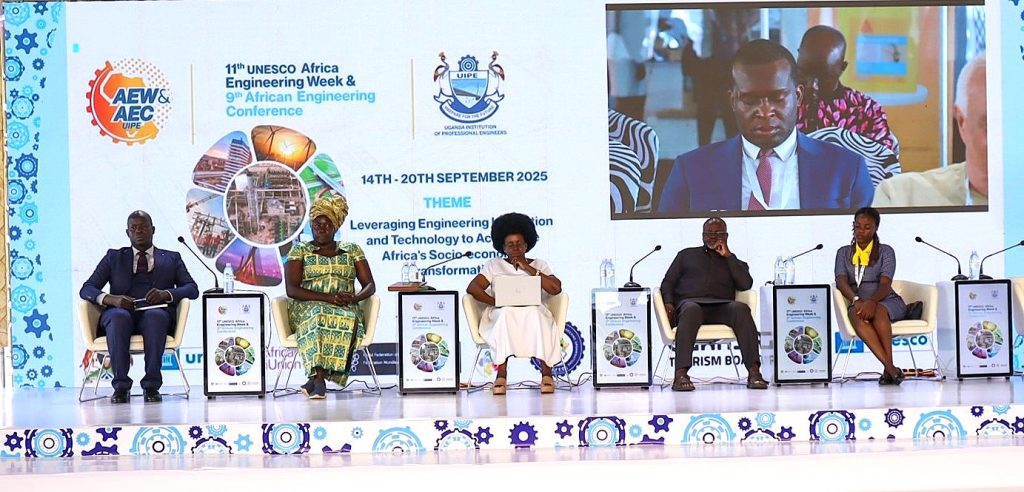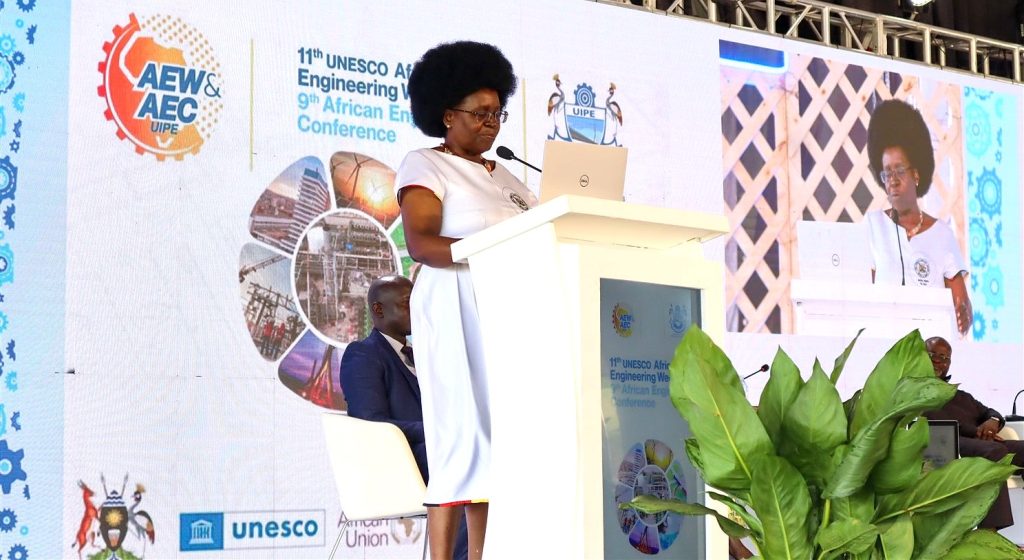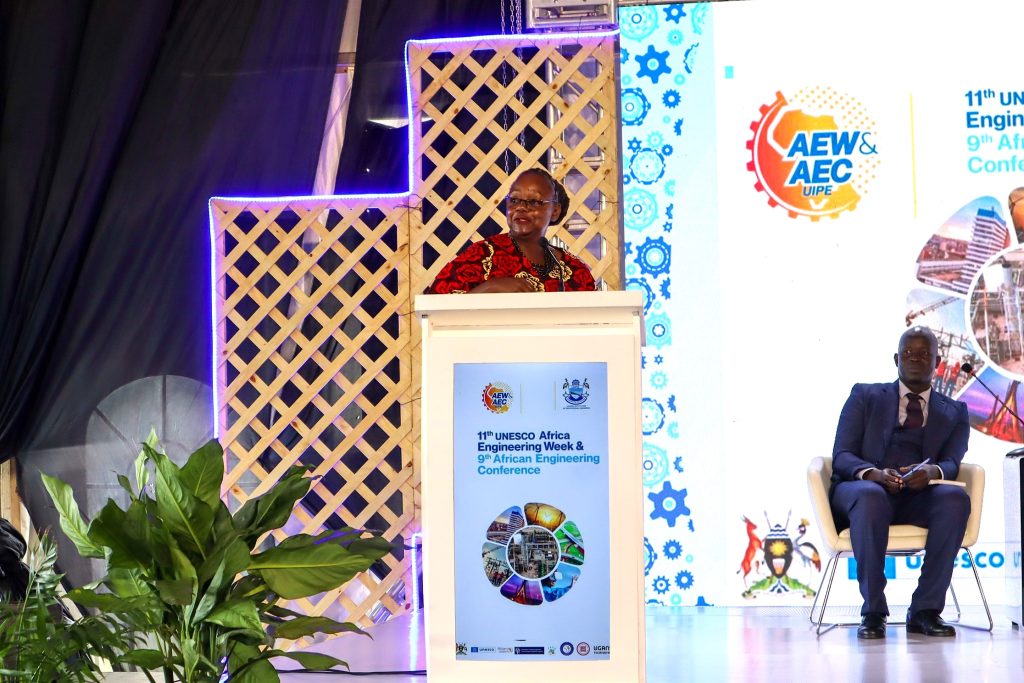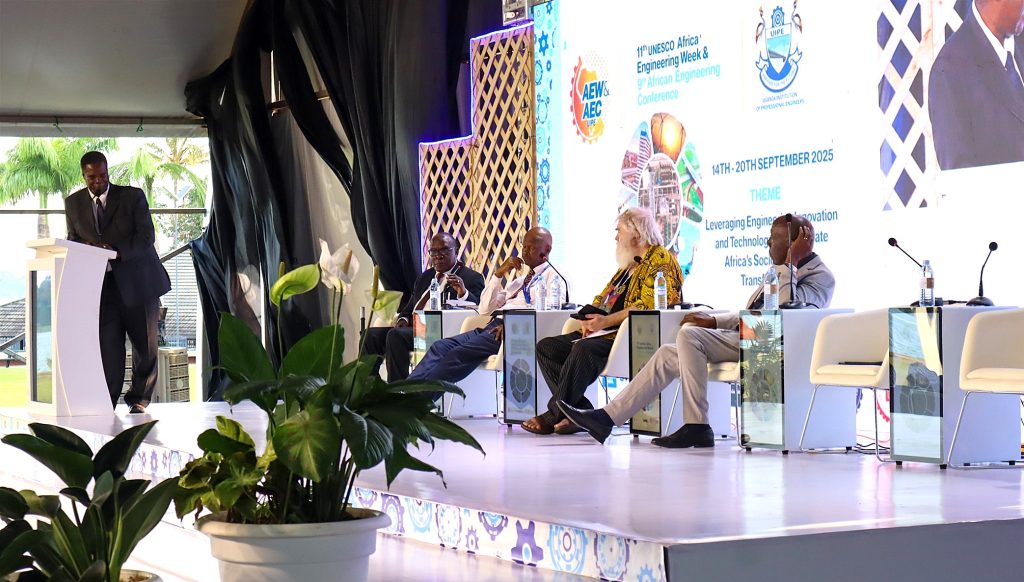By Kikomeko Pius
On September 17th, 2025, the Consortium of University Engineering Deans in Uganda (CUED-U) was launched at Speke Resort, Munyonyo, as a significant side event during the 11th UNESCO Africa Engineering Week & 9th African Engineering Conference.
Under the theme “Building a Collective Vision for Engineering Education,” the event signaled a united front for advancing the nation’s engineering profession. Hon. Dr. Monica Musenero, the Minister for Science, Technology, and Innovation Information, was the keynote speaker for the event and officially inaugurated the consortium.
The formation of CUED-U is the result of a pivotal discussion held on July 3rd, 2025, at the School of Engineering, College of Engineering, Design, Art and Technology, Makerere University, which proposed a forum for deans of engineering from universities across Uganda. This proposal sparked extensive engagement that led to the creation of a powerful new body for collaboration in engineering education.

The interim Chair of CUED-UEng. Dr. Henry K. Ntale, Dean of the Faculty of Engineering and Survey at Ndejje University, highlighted the historic nature of the consortium in his opening remarks. He noted that this is the first time Deans in Engineering in Uganda have come under one umbrella, explaining that the number of institutions offering engineering has grown from a single university in the past to 8 public and 5 private universities. This growth, he emphasized, necessitates a coordinated partnership to streamline government engagement and present a strong, unified front when dealing with international partners.
- Strengthening Research and Innovation Capacity: The consortium will coordinate research initiatives, focusing institutional resources on Uganda’s priority areas such as infrastructure development, renewable energy, agricultural technology and digital transformation.
- Fostering Strategic Industry Partnerships: Acting as the primary link between academia and industry, CUED-U will ensure engineering curricula are responsive to market demands while creating clear pathways for graduate employment and entrepreneurship.
- Supporting National Policy Development: The consortium will offer technical expertise and evidence-based recommendations to aid the government in formulating policies related to engineering education, technology transfer and workforce development.
- Advancing Regional Leadership: A key ambition is to position Uganda as the premier destination for engineering education in East Africa, which will help attract international students and investment to the region.

Dr. Dorothy Okello, Dean of Makerere University’s School of Engineering, expressed profound gratitude to Dr. Musenero for her inspirational remarks. She thanked the UNESCO Africa Engineering Week & African Engineering Conference organizers for the platform that enabled CUED-U’s launch. Dr. Okello also acknowledged UNESCO and the Royal Academy of Engineering for their local-level support, emphasizing that exposure must now translate into action as institutions leverage newly available infrastructure. She framed the launch of CUED-U as a pivotal moment for Ugandans to “take charge of our own journey”

A highlight of the event was an engaging roundtable panel discussion on “The Future of Engineering Education in Uganda,” moderated by Eng. Dr. Henry K. Ntale. The panelists included ;
- Prof. Eriabu Lugujjo – Executive Director of the Uganda Vice Chancellors’ Forum
- Prof. Henry Alinaitwe – Chairman, Engineers Registration Board (ERB)
- Assoc. Prof. Julian Cox – Associate Dean (International), University of New South Wales, Sydney.
- Eng. Richard Matsiko – Acting CEO, Uganda Electricity Transmission Company Limited (UETCL)
The discussion identified several critical gaps in the current training of engineers in Uganda:
- Prof. Eriabu Lugujjo pointed out that for the past 45 years, there has been no legal framework to incentivize collaboration between universities and industry. This has created challenges, such as some universities having to pay industries to accept their students for internships.
- Eng. Richard Matsiko noted that many graduates lack practical exposure, a gap that continues into employment. He attributed this to a misaligned curriculum, rapid industry changes and a lack of employer input. He also stressed the need to supplement technical skills with soft skills which build on attributes like resilience, communication and critical thinking.
- Assoc. Prof. Julian Cox shared insights from Australia, where his university maintains strong control over curriculum design, has a robust industrial training program with over 600 industry partners and this program is required for graduation and has produced the most employable graduates in the country for over 5 consecutive years.
- Prof. Henry Alinaitwe emphasized the role of the Engineers Registration Board (ERB) and encouraged all engineers to register. He explained that registration requires a degree, two years of mentored work, two years of independent work and proper documentation in career and technical reports, a process many engineers avoid or for which they fail to keep adequate records.

The launch of CUED-U is not just the formation of a new committee, it is a strategic and unified response to the challenges and opportunities facing the engineering profession in Uganda. With a clear vision and a collaborative framework, the consortium is now poised to address the gaps in education, foster innovation and build a future where Ugandan engineers lead the nation toward its Vision 2040 goals.
